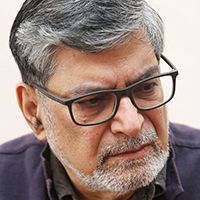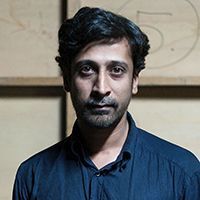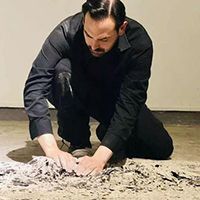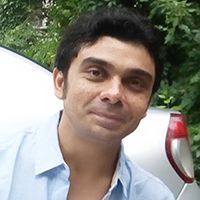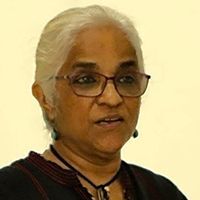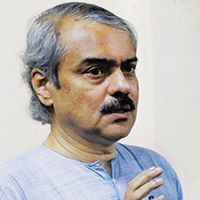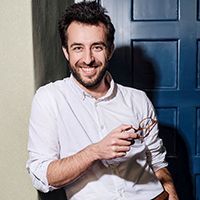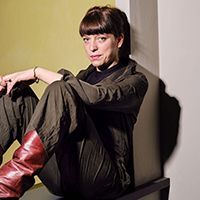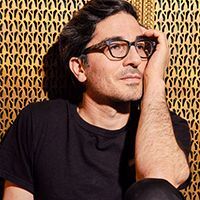Thinking Through Process
Workshop
-
Goethe-Institut / Max Mueller Bhavan Kolkata, Kolkata
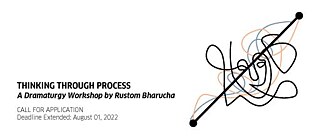
A Dramaturgy Workshop by Rustom Bharucha
This workshop is the second in a series of workshops being conducted by Rustom Bharucha at different locations in India. Its overall purpose is to introduce the fundamental principles of dramaturgy relating to form, structure and concept through a series of exercises, discussions and interactions with resource persons. With the overall objective of creating new narratives and projects, the workshop will focus on devised and documentary theatre practices, in addition to probing the role of dramaturgy in relation to direction, playwriting and adaptation. While dramaturgy can be understood as the translation of concept into practice with theatre productions in mind, it has now come to be applied to other disciplines as well including dance, movement, visual installations, and exhibitions. The workshop will include sessions with experts from India and abroad.
‘Thinking Through Process’ will encourage its participants to think through the possibilities of their ongoing projects or emergent ideas for new creative work. Since the workshop attempts to focus on individual creative processes, it is open to a maximum of twelve participants who will be chosen out of all the applications.
Download the Call for Application here:
Applications will be received till 1 August 2022
Details about Rustom Bharucha:
Rustom Bharucha, who will conduct the workshop, trained as a dramaturg at the Yale School of Drama between1977-1980. He has since directed and conducted workshops in different parts of the world in India, the Philippines, South Africa and Brazil. He has written a number of books including “Theatre and the World: Performance and the Politics of Culture”, “The Politics of Cultural Practice: Thinking through Theatre in an Age of Globalization” and “Terror and Performance.” His 9-episode video-lecture on “Theatre and the Coronavirus” can be accessed on the following link:
https://www.geisteswissenschaften.fu-berlin.de/en/v/interweaving-performance-cultures/online-projects/index.html
EXPERTS:
Sankar Venkateswaran
Sankar Venkateswaran is a theatre director from Kerala. He studied directing at School of Drama and Fine Arts, University of Calicut, after which he trained at Theatre Training and Research Programme, Singapore. His works include “Sahyande Makan: The Elephant Project” (2008), Shogo Ota’s “Water Station” (2011), Henrik Ibsen’s “When We Dead Awaken” (2012), “INDIKA” (2017) for Munich Volkstheater, “Criminal Tribes Act” (2017), Maurice Maeterlinck’s “Interior” (2020) for Ninasam, “In My Time of Dying” (2022) for Theaterhaus Jena, and Duncan Macmillan's “Every Brilliant Thing” (2022). Sankar's works have been presented at various theatres and festivals such as Zurich Theater Spektakel, Spielart Munich, Kyoto Experiment, Zoukak Sidewalks in Beirut, and Theater Commons Tokyo. He lives and works from Sahyande theatre, a theatre-dwelling he built in Attappadi.
Kai Tuchmann
Kai Tuchmann works as a dramaturge, director and academic. As a visiting professor at the Central Academy of Drama in Beijing, he helped develop the curriculum for the BA Dramaturgy program there. Kai has also researched the history of dramaturgy as a Fulbright Scholar at the Graduate Center of the City University New York, and he is a Fellow of the Mellon School of Theater at Harvard University. In his internationally shown documentary theater works, Kai has explored the afterlife of the Cultural Revolution in contemporary China, the impact of urbanization on migrant workers in Europe and Asia, and the role of the body in the face of digital technologies.
Vikram Iyengar
Vikram Iyengar is an arts leader and connector based in Calcutta, India and working internationally. A dancer-choreographer, arts writer, and curator-presenter, he heads the performance company Ranan and the Pickle Factory Dance Foundation. His scope of work spans practice, discourse, critique and management, and revolves around the central tenet of creating deep connections with and through the arts. An ARThink South Asia Arts Management Fellow, Global Fellow of the International Society for the Performing Arts, and alumnus of the Australian International Arts Leaders programme, Vikram was awarded the Ustad Bismillah Khan Yuva Puraskar from the Sangeet Natak Akademi, Government of India for his work in contemporary dance in 2015.
Maya Krishna Rao
Maya is performer - director and teacher. She has made several solo performances over the last 35 years in various genres - dance-theatre, cross-media, comedy, etc. She directs herself in these shows. Maya has also taught in the National School of Drama, Shiv Nadar University and Ashoka University
Ananda Lal
Ananda Lal retired as Professor of English, Jadavpur University, where he taught drama and introduced a practical theatre course in which he directed students for public performances every year for 25 years. He completed a Ph.D. in Theatre from the USA in 1986 and as theatre critic of The Telegraph (1986-2018) and The Times of India (2018-lockdown), he reviewed more than 3000 productions. He now runs kolkatatheatre.com, devoted to theatre in Kolkata. His most important books include Rabindranath Tagore: Three Plays (the first English book exclusively on Tagorean drama), The Oxford Companion to Indian Theatre (the first reference work on this subject in any language), Indian Drama in English: The Beginnings and the latest, Utpal Dutt's Barricade. He has directed over 30 theatre productions, worked on many others, especially such international successes as Midsummer Night’s Dream (British Council) for which he did the dramaturgy, and lectured widely abroad and at home on Indian theatre.
From Münchner Kammerspiele
The Münchner Kammerspiele is one of the most important theatres in Germany, since its beginning, the theatre has been characterised by a strong ensemble that seeks to engage with the present.
Martin Valdés-Stauber
Martin Valdés-Stauber has been a member of the Artistic Directional Team of the Münchner Kammerspiele as dramaturg since 2017. Previously, he studied Sociology and Economics in Munich, Friedrichshafen, Berkeley and Cambridge. Since he returned to Munich, he is teaching at various universities and deals with the interweaving of artistic, literary and sociological knowledge about the city. Since 2020, Martín Valdés-Stauber has also been an honorary “Commissioner for Open Society” in his hometown of Kaufbeuren. In the past he has worked with names like Rabih Mroué, Marlene Monteiro Freitas, Philipe Quesne, Rimini Protokoll (Stefan Kaegi), Marco Layera and Milo Rau. Since 2018, he has been carrying out research for the long-term project Schicksale (Fates) with Janne and Klaus Weinzierl. The project investigates the lives of those who worked at the Münchner Kammerspiele and were persecuted by the Nazi regime. Since 2021 he leads the artistic research area “Erinnerung als Arbeit an der Gegenwart” (Memory as Work on the Present).
Nele Jahnke
As a long-term artistic collaborator and Artistic Co-Director of the HORA theatre in Zurich, Nele Jahnke has advocated for the visibility and co-determination of “disabled” artists both in the theatre world and in the public eye. She directed numerous projects with the HORA ensemble and developed various communication and audience formats. Together with M. Elber und M. Bugiel, she designed and managed the long-term experiment Freie Republik HORA (HORA Free Republic) in which the ensemble directed themselves. Nele grew up in Ostholstein and Berlin, and studied Theatrical Direction at Zurich University of the Arts. She is part of the Planetensystem theatre troupe and also works as a freelance performer and director. In 2019 she was awarded the development grant from the Canton of Zurich. Since 2020, Nele has been part of the Artistic Directional Team at the Münchner Kammerspiele as a Dramaturge and a Director.
Mehdi Moradpour
Mehdi Moradpour is an author, court and community interpreter, and a translator for Persian (Farsi & Dari) and Spanish. After completing technical studies in Iran, he began studying Spanish Studies, IT, Sociology, American Studies and Arabic Studies in Leipzig and Havanna in 2004, and in 2014 he started a Scenic Writing course in Graz. At the same time, he performed with various independent theatre groups and wrote journalistic articles about culture and theatre. His writings have won many awards and have been translated into multiple languages. He has collaborated with Deutsche Oper Berlin, the Maxim Gorki theatre, Theater Konstanz, Schauspielhaus Vienna, Wiener Festwochen arts festival, Grips Theater and Theater Bremen. From 2020 he has been a Dramaturge in the Artistic Directional Team at the Münchner Kammerspiele.
This workshop is the second in a series of workshops being conducted by Rustom Bharucha at different locations in India. Its overall purpose is to introduce the fundamental principles of dramaturgy relating to form, structure and concept through a series of exercises, discussions and interactions with resource persons. With the overall objective of creating new narratives and projects, the workshop will focus on devised and documentary theatre practices, in addition to probing the role of dramaturgy in relation to direction, playwriting and adaptation. While dramaturgy can be understood as the translation of concept into practice with theatre productions in mind, it has now come to be applied to other disciplines as well including dance, movement, visual installations, and exhibitions. The workshop will include sessions with experts from India and abroad.
‘Thinking Through Process’ will encourage its participants to think through the possibilities of their ongoing projects or emergent ideas for new creative work. Since the workshop attempts to focus on individual creative processes, it is open to a maximum of twelve participants who will be chosen out of all the applications.
Download the Call for Application here:
Applications will be received till 1 August 2022
Details about Rustom Bharucha:
Rustom Bharucha, who will conduct the workshop, trained as a dramaturg at the Yale School of Drama between1977-1980. He has since directed and conducted workshops in different parts of the world in India, the Philippines, South Africa and Brazil. He has written a number of books including “Theatre and the World: Performance and the Politics of Culture”, “The Politics of Cultural Practice: Thinking through Theatre in an Age of Globalization” and “Terror and Performance.” His 9-episode video-lecture on “Theatre and the Coronavirus” can be accessed on the following link:
https://www.geisteswissenschaften.fu-berlin.de/en/v/interweaving-performance-cultures/online-projects/index.html
EXPERTS:
Sankar Venkateswaran
Sankar Venkateswaran is a theatre director from Kerala. He studied directing at School of Drama and Fine Arts, University of Calicut, after which he trained at Theatre Training and Research Programme, Singapore. His works include “Sahyande Makan: The Elephant Project” (2008), Shogo Ota’s “Water Station” (2011), Henrik Ibsen’s “When We Dead Awaken” (2012), “INDIKA” (2017) for Munich Volkstheater, “Criminal Tribes Act” (2017), Maurice Maeterlinck’s “Interior” (2020) for Ninasam, “In My Time of Dying” (2022) for Theaterhaus Jena, and Duncan Macmillan's “Every Brilliant Thing” (2022). Sankar's works have been presented at various theatres and festivals such as Zurich Theater Spektakel, Spielart Munich, Kyoto Experiment, Zoukak Sidewalks in Beirut, and Theater Commons Tokyo. He lives and works from Sahyande theatre, a theatre-dwelling he built in Attappadi.
Kai Tuchmann
Kai Tuchmann works as a dramaturge, director and academic. As a visiting professor at the Central Academy of Drama in Beijing, he helped develop the curriculum for the BA Dramaturgy program there. Kai has also researched the history of dramaturgy as a Fulbright Scholar at the Graduate Center of the City University New York, and he is a Fellow of the Mellon School of Theater at Harvard University. In his internationally shown documentary theater works, Kai has explored the afterlife of the Cultural Revolution in contemporary China, the impact of urbanization on migrant workers in Europe and Asia, and the role of the body in the face of digital technologies.
Vikram Iyengar
Vikram Iyengar is an arts leader and connector based in Calcutta, India and working internationally. A dancer-choreographer, arts writer, and curator-presenter, he heads the performance company Ranan and the Pickle Factory Dance Foundation. His scope of work spans practice, discourse, critique and management, and revolves around the central tenet of creating deep connections with and through the arts. An ARThink South Asia Arts Management Fellow, Global Fellow of the International Society for the Performing Arts, and alumnus of the Australian International Arts Leaders programme, Vikram was awarded the Ustad Bismillah Khan Yuva Puraskar from the Sangeet Natak Akademi, Government of India for his work in contemporary dance in 2015.
Maya Krishna Rao
Maya is performer - director and teacher. She has made several solo performances over the last 35 years in various genres - dance-theatre, cross-media, comedy, etc. She directs herself in these shows. Maya has also taught in the National School of Drama, Shiv Nadar University and Ashoka University
Ananda Lal
Ananda Lal retired as Professor of English, Jadavpur University, where he taught drama and introduced a practical theatre course in which he directed students for public performances every year for 25 years. He completed a Ph.D. in Theatre from the USA in 1986 and as theatre critic of The Telegraph (1986-2018) and The Times of India (2018-lockdown), he reviewed more than 3000 productions. He now runs kolkatatheatre.com, devoted to theatre in Kolkata. His most important books include Rabindranath Tagore: Three Plays (the first English book exclusively on Tagorean drama), The Oxford Companion to Indian Theatre (the first reference work on this subject in any language), Indian Drama in English: The Beginnings and the latest, Utpal Dutt's Barricade. He has directed over 30 theatre productions, worked on many others, especially such international successes as Midsummer Night’s Dream (British Council) for which he did the dramaturgy, and lectured widely abroad and at home on Indian theatre.
From Münchner Kammerspiele
The Münchner Kammerspiele is one of the most important theatres in Germany, since its beginning, the theatre has been characterised by a strong ensemble that seeks to engage with the present.
Martin Valdés-Stauber
Martin Valdés-Stauber has been a member of the Artistic Directional Team of the Münchner Kammerspiele as dramaturg since 2017. Previously, he studied Sociology and Economics in Munich, Friedrichshafen, Berkeley and Cambridge. Since he returned to Munich, he is teaching at various universities and deals with the interweaving of artistic, literary and sociological knowledge about the city. Since 2020, Martín Valdés-Stauber has also been an honorary “Commissioner for Open Society” in his hometown of Kaufbeuren. In the past he has worked with names like Rabih Mroué, Marlene Monteiro Freitas, Philipe Quesne, Rimini Protokoll (Stefan Kaegi), Marco Layera and Milo Rau. Since 2018, he has been carrying out research for the long-term project Schicksale (Fates) with Janne and Klaus Weinzierl. The project investigates the lives of those who worked at the Münchner Kammerspiele and were persecuted by the Nazi regime. Since 2021 he leads the artistic research area “Erinnerung als Arbeit an der Gegenwart” (Memory as Work on the Present).
Nele Jahnke
As a long-term artistic collaborator and Artistic Co-Director of the HORA theatre in Zurich, Nele Jahnke has advocated for the visibility and co-determination of “disabled” artists both in the theatre world and in the public eye. She directed numerous projects with the HORA ensemble and developed various communication and audience formats. Together with M. Elber und M. Bugiel, she designed and managed the long-term experiment Freie Republik HORA (HORA Free Republic) in which the ensemble directed themselves. Nele grew up in Ostholstein and Berlin, and studied Theatrical Direction at Zurich University of the Arts. She is part of the Planetensystem theatre troupe and also works as a freelance performer and director. In 2019 she was awarded the development grant from the Canton of Zurich. Since 2020, Nele has been part of the Artistic Directional Team at the Münchner Kammerspiele as a Dramaturge and a Director.
Mehdi Moradpour
Mehdi Moradpour is an author, court and community interpreter, and a translator for Persian (Farsi & Dari) and Spanish. After completing technical studies in Iran, he began studying Spanish Studies, IT, Sociology, American Studies and Arabic Studies in Leipzig and Havanna in 2004, and in 2014 he started a Scenic Writing course in Graz. At the same time, he performed with various independent theatre groups and wrote journalistic articles about culture and theatre. His writings have won many awards and have been translated into multiple languages. He has collaborated with Deutsche Oper Berlin, the Maxim Gorki theatre, Theater Konstanz, Schauspielhaus Vienna, Wiener Festwochen arts festival, Grips Theater and Theater Bremen. From 2020 he has been a Dramaturge in the Artistic Directional Team at the Münchner Kammerspiele.
Location
Goethe-Institut / Max Mueller Bhavan Kolkata
Park Mansions, Gate 4
57A, Park Street
Kolkata 700 016
India
Park Mansions, Gate 4
57A, Park Street
Kolkata 700 016
India
Location
Goethe-Institut / Max Mueller Bhavan Kolkata
Park Mansions, Gate 4
57A, Park Street
Kolkata 700 016
India
Park Mansions, Gate 4
57A, Park Street
Kolkata 700 016
India
